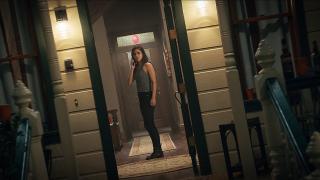Monday, January 31, 2022
Scream Slashes A Brutal And Worthy Sequel That Honors Wes Craven's Legacy
Sunday, January 23, 2022
Ridley Scott's The Last Duel Is A Slow-Moving Yet Unflinchingly Brutal And Thought-Provoking Period Drama
Monday, January 17, 2022
House Of Gucci Delivers Glamorous Yet Uneven Entertainment That's Elevated By A Mesmerizing Performance from Lady Gaga
Friday, January 14, 2022
Netflix's Don't Look Up Cleverly Blends Satire And Heart To Deliver An Important Message To Audiences
Don't Look Up's plot has two astronomers (Leonardo DiCaprio and Jannifer Lawrence) discovering a comet heading towards Earth that will cause an extinction level event. Both go to extreme pains to convince the government and media that it's real, only to have their efforts met with indifference and political backlash. Don't Look Up provides laughs while delivering scrutiny towards certain sectors of the American population, the media, and right-wing authoritarian style leadership for its disregarding of science and caring more about image. Although its messaging can be seen as appearing heavy-handed at times, Don't Look Up tackles it's important subject matter with humor and heart.
When it comes to performances, Don't Look Up's star-studded cast deliver fantastic performances that help make the films plot feel more engaging to audiences. Both DiCaprio and Lawrence are on top form here as astronomers Dr. Randall Mindy and Kate Dibiasky. They show their characters shock and frustration towards the lack of seriousness being directed towards their discovery by authorities. Both performances go hand-in-hand and work exceptionally well together on screen. Meryl Streep is brilliant as neglectful President Of The United States, Janie Orleans, who shows herself to be less concerned about the dangers of the comet and more about her public image regarding the upcoming midterms. Jonah Hill does terrific as Janine's son and White House Chief Of Staff Jason Orlean with his character appearing to be as equally tone deaf as his mother upon learning of the comet. Other noteworthy performances from the cast include Rob Morgan as Dr. Teddy Oglethorpe, head of the Planetary Defense Coordination Office, Cate Blanchett and Tyler Perry as co-hosts of The Daily Rip, Brie Evantee and Jack Bremmer, Mary Rylance as tech billionaire CEO of Bash Peter Isherell with his character feeling like a combination of Jeff Bezos and Elon Musk, with Timothee Chalamet as young shoplifter Yule who supports Kate's claim. Overall, Don't Look Up's cast is stellar and add to the stories realism with everyone effectively slipping into character and delivering strong work.
Directed by Adam McKay who helmed 2018's Vice. He applies the same satirical style of that film here while uniquely blending comedy and realism together. He gives Don't Look Up cinematography that's clean and bright with the films colors really hitting the screen, along with different camera tricks to capture the actors facial expressions. He does a fantastic job of blending the two together when disaster strikes, increasing the audiences anxiety regarding wanting to know what happens next in the story. The film contains a few visual moments which showcases the comet barreling towards Earth along with other shots including outer space, explosions, and the revealing of an alien creature. The film is exceedingly fast-paced with the audience growing more anxious of what happens next as the story progresses. The soundtrack consists of a wide-variety of songs, including a low-key score that hits home during the films emotional moments. Whereas McKay's films generally boast a documentary style look to them, he opts to deliver a different approach here that presents a rapid feel that mirrors audiences everyday life.
























































